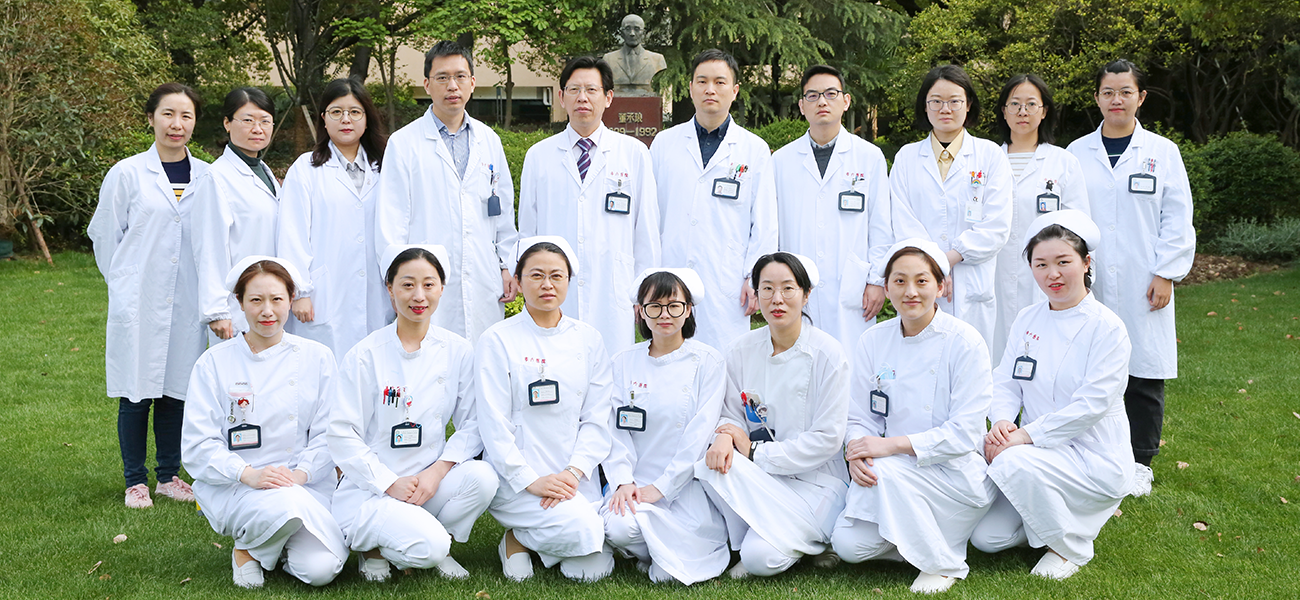
The Department of Rheumatology and Immunology was established in 2016. After years of development, it has evolved into a comprehensive, interdisciplinary institution that integrates medical care, education, and research. Affiliated to Shanghai Jiao Tong University School of Medicine, this department serves as a distinguished training center for both master's and doctoral degrees, and also facilitates post-doctoral studies. Moreover, it holds prestigious certification from Shanghai Municipal Health Commission as a specialized training base for Rheumatologists, and works as a rheumatological center of clinical trials authorized by National Medical Products Administration of China. It has been recognized as one of the fastest-growing rheumatology departments in China.
Annually, it cares more than 1,000 in-patients and serves more than 60,000 outpatient visits, with these numbers steadily increasing, positioning it among the top 5 in Shanghai’s tertiary hospitals and medical centers. The department specializes in treating various rheumatic diseases, with a particular emphasis on arthritis and allied conditions, garnering nationwide recognition for its capabilities.
While strengthening its own construction, Prof. Sheng-Ming Dai, chief of the department, is frequently invited to contribute editorial commentary on clinical trends or clinical deficiencies in China in academic journals such as the Chinese Medical Journal and the Chinese Journal of Rheumatology. Prof. Dai has also served as the leading expert in developing clinical consensus or guidelines for diseases such as psoriatic arthritis, ankylosing spondylitis, and non-radiographic axial spondyloarthritis. As a chief editor, Prof. Dai has published the book “Psoriatic Arthritis” at People's Health Press. Being a co-editor, he has published some books such as “Chinese Rheumatology Atlas: The Section on Spondyloarthritis”. Prof. Dai and his colleagues in the department are regularly invited to give lectures at more than 20 academic conferences in China each year, sharing their cutting-edge knowledge and experiences in the diagnosis and treatment of arthritis and related diseases. Through these efforts, they have promoted the standardization of the diagnosis and therapeutic strategy of arthritis in China significantly.
The department's expertise extends far beyond arthritis, encompassing the diagnosis and treatment of systemic lupus erythematosus, Sjögren syndrome, systemic sclerosis, systemic vasculitis, interstitial lung disease associated with inflammatory myopathies, adult Still disease, and miscellaneous difficult-to-be-diagnosed diseases. With multidisciplinary collaborations, biopsy and histopathology of salivary glands, peripheral nerves, skeletal muscles, lymph nodes, and skins can be performed routinely. Plasma exchange and blood purification with immunoabsorption are applied occasionally. Being deputy editors, Prof. Dai and his colleagues have published the books “Systemic Vasculitis”, “Chinese Rheumatology Atlas: The Section on Systemic Lupus Erythematosus” and “Stem Cells and Autoimmune Diseases”. Additionally, Prof. Dai played a key role in the workshop “Guidelines for the Diagnosis and Treatment of Systemic Sclerosis” and Prof. Zhiyong Chen, another rheumatologist in the department drafted a section of the “Chinese Expert Consensus on the Diagnosis and Treatment of Interstitial Lung Disease Associated with Idiopathic Inflammatory Myopathy”.
Supported by the hospital's strong comprehensive capabilities, various laboratory tests related to rheumatic diseases are routinely conducted. The department is at the forefront in China in terms of techniques such as musculoskeletal ultrasound imaging, high-resolution CT, dual-energy CT, various magnetic resonance imaging scanning technologies, skin and capillary microscopy examination, second-generation pathogenomics sequencing, and whole-genome sequencing for genetic diseases.
The ongoing research projects in the department were funded by grants from the National Natural Science Foundation of China (NSFC), the Shanghai Pujiang Talent Program, the National Excellent Postdoctor Program, and so on. The department closely collaborates with research institutes such as Shanghai Institute of Immunology and Chinese Academy of Sciences. Both basic studies on the pathogenesis as well as the exploration of new treatment targets of inflammatory arthritis, systemic sclerosis, and pulmonary fibrosis, and clinical studies on epidemiology, early diagnosis, and optimal therapeutic strategies, are pursued in the department. On average, over 10 SCI-indexed papers are published annually.
The Department of Rheumatology and Immunology fosters a harmonious and dynamic environment, and eagerly welcomes young talents from both domestic and international institutions and universities who are passionate about pursuing clinical or basic studies in rheumatic diseases to join us!




